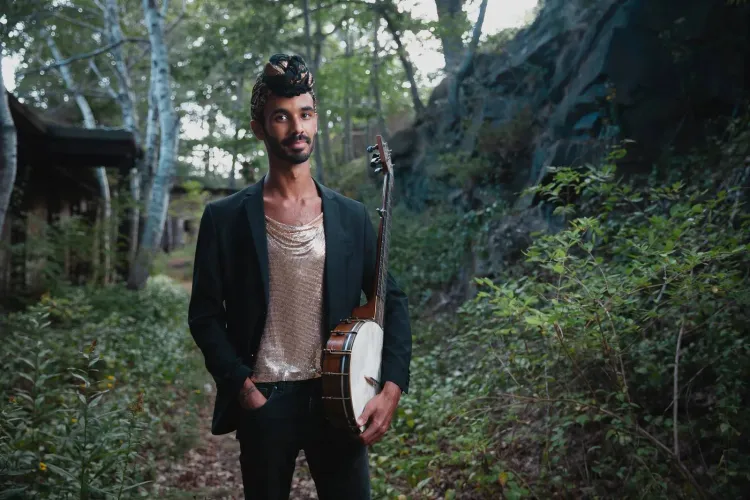An Evening with Jake Blount

The Swarthmore College Orchestra
On Feb 3, Jake Blount – an award-winning and genre-defying musician – will visit Swarthmore for a performance and on-stage conversation with students. Blount fell in love with traditional music through the banjo, but was troubled by the whitewashing and heteronormative lens of folk music. Folk songs were historically played in blackface at minstrel shows or recorded with racist lyrics. At performances, Blount confronts this and teaches people about the roots of the genre, serving as an interpreter of Black folk music.
"I know what it makes me feel when I'm at a fiddle festival and I hear someone play 'Turkey in the Straw' [a 19th century folk tune whose adaptations use racist lyrics]," Blount said in an interview with NPR. "When I hear that, I will go up to the person and say, 'You should stop,' but I didn't feel empowered to do that for a very long time."
Not only does Blount educate on the roots of folk music; he is expanding the canon to include his own compositions that draw on Afrofuturism. He uses the fiddle, electric guitar, banjo, and synthesizer to connect the past with issues of the present such as the Black Lives Matter protests.
“I believe our most likely future bears a close resemblance to our past," Blount wrote in the liner notes of his album The New Faith. “My vision of civilization's course does not involve glittering ships hurtling through the cosmos.”
Blount’s performances range from solo to full-band festival sets, at venues such as Carnegie Hall, the Library of Congress and NPR’s Tiny Desk.
Graduating with a Bachelors of Arts in Ethnomusicology from Hamilton College in 2017, Blount’s thesis was titled ‘Fiddles in the North Country: Uncovering the Ithaca Sound’ and was described as “an ethnography documenting the nature and development of Ithaca, NY’s regional style of string band music.” Since graduating he’s given lectures and presentations on his research and the history of Black string band music at Yale University, Berklee College of Music, and the Smithsonian Institute. Currently, Blount is working towards a Ph.D in Musicology and Ethnomusicology at Brown University.
Blount is interested in the ways in which African Americans have “shaped and defined the amorphous categories of roots music and Americana” — something that is evident throughout his music. His first album Spider Tales was named one of the year’s best by NPR and earned a perfect 5-star rating from The Guardian. It focused on highlighting Black and Indigenous histories and reviving songs that had been forgotten over decades of whitewashing. Blount views his music as connecting past histories, the present moment and our future; according to his website, he believes that “the more we learn about where we’ve been, the better equipped we are to face the future.”
His most recent album, The New Faith, was written and recorded during the months of COVID-lockdowns and is centered around key questions: “What would Black music sound like after climate change renders most of the world uninhabitable? What gods would this community praise, and what stories would they tell?”
Blount’s new arrangements of traditional music highlight the disproportionate burden of the climate crisis on Black Americans. He draws inspiration from various figures over decades of history such as “civil rights activist and organizer Fannie Lou Hamer, trailblazer and queer icon Sister Rosetta Tharpe, peerlessly expressive gospel singer Mahalia Jackson” and more. The music is an afrofuturistic blend of stomps and handclaps, fiddles, the electric guitar, synthesized sounds and the banjo, with Blount’s voice serving as the grounding center.
In an NPR profile on The New Faith, Blount said, “Over time I've gone from feeling like I'm doing the work of educating people about this stuff to feeling like I am exploring its significance to me and to other people like me, and that doesn't feel as much like labor."
The Department of Music looks forward to welcoming Jake Blount in concert on Saturday, February 3rd at 8pm in Lang Concert Hall. The performance will be preceded by a lecture and demonstration at 5pm in the Lang Concert Hall. The events are free and open to the public, no reservation required.



